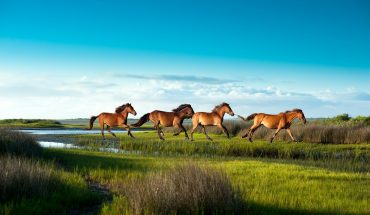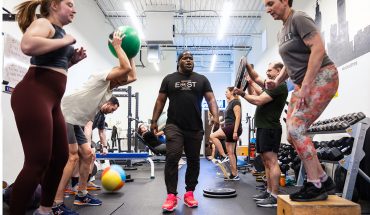by Allie Higgins
photographs by Geoff Wood
John McHugh never imagined he would drive the train at Pullen Park; he was too busy clowning around. That started early, at Ringling Brothers and Barnum & Bailey Clown College, back in 1978. But five years ago, after a lifetime in circuses around the country, the onetime N.C. State student yearned for a change of scene. He found it at Raleigh’s Pullen Park. He’s been here ever since, driving the park’s train, and waving to smiling visitors.
“This morning I got up, and I was excited to be coming to the park,” McHugh says as he prepares the train for its first run on an early-summer Friday morning. “The train is the one ride where, as a ride operator, you actually go someplace. So you have responsibilities with the train.” Those responsibilities begin shortly after 9 a.m. as McHugh, 62, and his co-worker, Jim “Dmytro” Socko, 83, run a series of checks. This early, the C.P. Huntington replica locomotive is housed in the park’s station, which extends through the tunnel at the front of the park.
Usually full of engine noise and the excited screams of passengers, the tunnel is eerily quiet at this hour. The silence lifts as McHugh and Socko joke about McHugh’s attention to detail – while he carefully removes chewing gum from the train benches.
“There are a lot of laughs here,” says McHugh with a grin. “Generally we joke with the people, we’re upbeat, because we want them to have a happy experience.”
But ride operators cannot be carefree. “The park in itself is not immune from serious things,” he says. “Someone can get injured.” So they’re careful. To begin, McHugh fuels the train with gas at a small filling station beyond the tunnel. Then he checks the oil the way you’d check it in your car, dunking and wiping a dip-stick. He opens the top of the radiator and gently runs his finger around the edge; he inspects the transmission.
Then the two take an oil can that could have belonged to the Tin Man himself to fill two small glass containers on the front of the train. This will keep the dummy wheel moving smoothly, they explain. McHugh lugs a bucket full of black grease onto the second train car. This will come in handy shortly, but first Socko and McHugh gear up for the first ride of the day. It’s a working ride.
From the passenger seat, Socko pulls on a pair of protective ear-muffs and reaches for the pull that sounds the train’s whistle: “Choo-choo,” it roars. Socko presses the ignition button, pushes the lever at the center of the lead-car, and now the train is moving. But not for long: Every few hundred yards, he explains, the tracks must be greased.
At the first designated greasing spot, Socko steps off of the elevated train-car, heads to the grease bucket, removes a two-foot-long slat of wood from the black goo, and gently taps the sludge against the train track on both sides. He is precise with his grease placement: If it gets on the top of the tracks, the wheels would slide. The operators repeat this process five times around the track.
 Around every curve and crossing, the train’s whistle sounds, and by the time they reach the playground, little noses are pressed up against the fence along the tracks. McHugh pulls the little locomotive into the station, then collects tickets, keeping 10 of them tucked between each of his knuckles as he goes. A total of 79 passengers, only one under the train’s limit, load onto the first official ride of the day. Socko and McHugh will switch roles throughout the day, one driving at the front, the other riding the caboose, to make sure all of their passengers are safe.
Around every curve and crossing, the train’s whistle sounds, and by the time they reach the playground, little noses are pressed up against the fence along the tracks. McHugh pulls the little locomotive into the station, then collects tickets, keeping 10 of them tucked between each of his knuckles as he goes. A total of 79 passengers, only one under the train’s limit, load onto the first official ride of the day. Socko and McHugh will switch roles throughout the day, one driving at the front, the other riding the caboose, to make sure all of their passengers are safe.
As the train scoots beside Western Boulevard traffic, around the glistening Pullen Park pond, and through the woods that back up to N.C. State’s campus, both train operators let their thoughts drift back to their pasts. Socko reminisces about his native Ukraine: of love, of war, of escaping restrictive governments. McHugh recalls learning to juggle in Pullen Park as a design student at N.C. State, and “coming full circle” within the park.
“I think it’s safe to say that people like myself enjoy the train for its own sake,” McHugh says.




